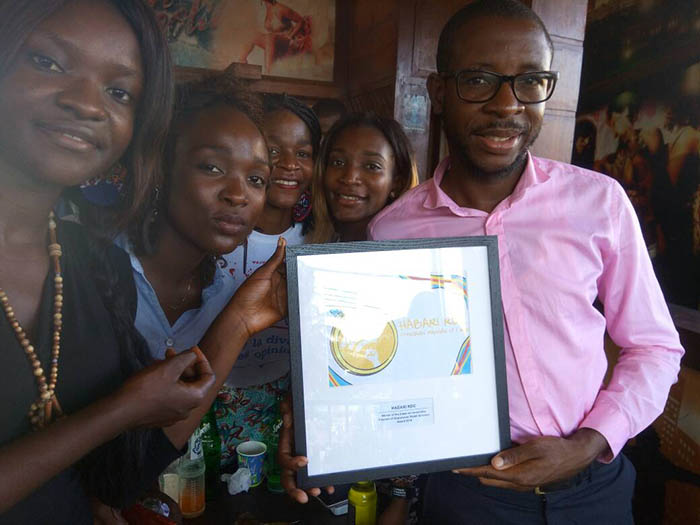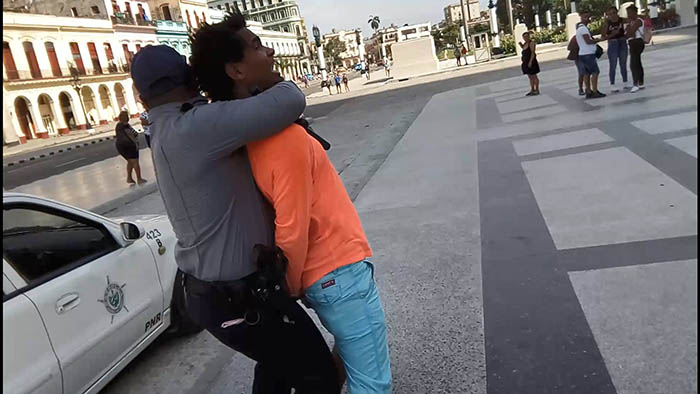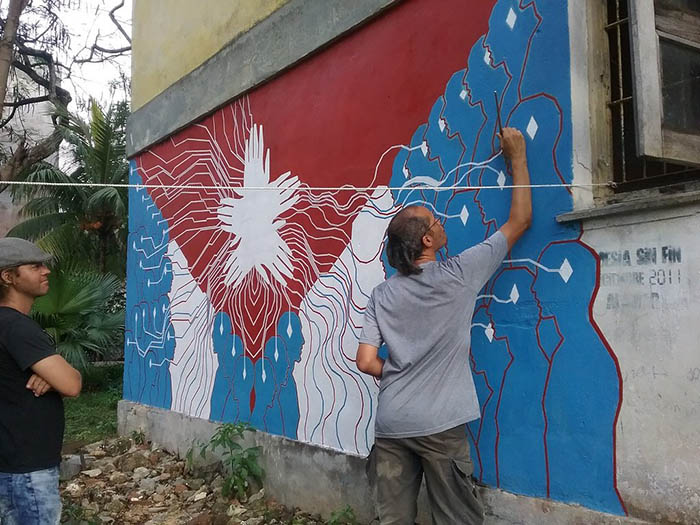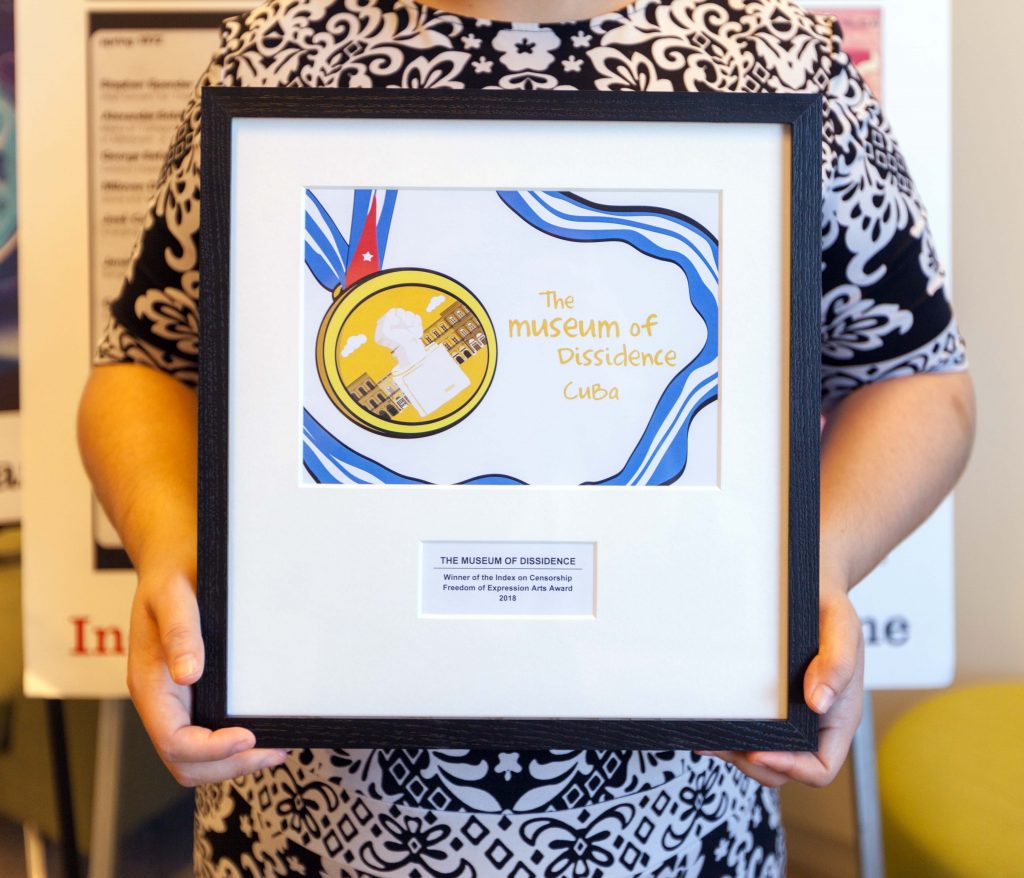24 Aug 2018 | Europe and Central Asia, European Union, Media Freedom, media freedom featured, News and features, Sweden
[vc_row][vc_column][vc_column_text]

An image from the website of the right-wing populist Sweden Democrats, who changed their logo from a National Front-esque torch to a flower in an effort to clean up their image.
Sweden baked in record temperatures this summer, matched only by the increasingly heated political climate as it gears up for an unprecedentedly bitter and divisive general election. Front page stories about raging wildfires and drought have given a poll boost to the Swedish Green Party as climate change has leapt up the agenda. For populist media critics, however, the attention given to the fires is part of a conspiracy to keep the Greens in government and to give the governing left-wing bloc a victory in September’s vote.
Edward Riedl, a conservative member of parliament for the opposition Moderate Party accused major newspapers of “agenda setting” by giving such prominent coverage to the environment, with one if his party colleagues calling out newspapers for being pro-Green.
The far right meanwhile maintains a longstanding animosity with Sweden’s established print and public service media, which they accuse of being a cosy cartel.
Marie Grusell, a media researcher at Gothenburg University, has compared the attacks to the ongoing deligitimisation of the press in the USA by the White House.
“It is a tactic to undermine journalism. I think this is beneath contempt,” she said in an interview with the Swedish newspaper Aftonbladet.
This bizarre challenging of factual environmental journalism takes place against a backdrop of an increasingly contentious news landscape, in which the fragmentation and polarisation of the Swedish political system has made it increasingly difficult to maintain the balance of the media.
Over the past decade – and in common with other European countries – Sweden has seen the emergence of a powerful populist and anti-immigration party, the Sweden Democrats. The Sweden Democrats have deployed a familiar cocktail of anti-media conspiracism, welfare nationalism and climate scepticism, as well as anti-feminist and anti-Islamic rhetoric, to move from a fringe group to a major parliamentary force with ambitions to form a government. Although they have their roots in the 1990s white power movement, the Sweden Democrats have tried to soften their image by shunning some of their more extreme members and, in 2006, changed their logo from a torch — similar to that once used by the British far-right National Front — to a cartoonish anemone hepatica, a flower in the buttercup family.
Public trust in the Swedish media is still holding up but has diminished among those drifting towards the Sweden Democrats. This section of voters have become resistant to large sections of the established media and have instead turned to social network news groups and fringe sites which claim to expose what is really happening in Swedish society, as well as foreign news sites from the USA and Russia. In an attempt to increase the amount of freely available objective media outlets, the daily Dagens Nyheter recently removed its paywall for the duration of the election campaign, but as with other established media, it may be too late for readers who have already moved on.
Increased extremism
The dangerous situation is compounded by movements operating at the political fringes who have targeted journalists. The Nordic Resistance Movement (NMR), a neo-Nazi white power group, regularly marches in shows of force, intimidating journalists, minority groups and other members of the public. In May Swedish security services raided the home or prominent NMR member Peter Holm and found a suitcase they believed had been adapted for assassinations, along with a hard drive containing details on two journalists.
NMR activists also marched at this year’s Almedalen politics festival, a high point of the political calendar where journalists, civic and business groups and politicians get together to discuss contemporary issues. The investigative anti-fascist magazine EXPO uncovered instructions for NMR activists to attend speeches by politicians and others and to shout “traitor to the people” at politicians, and confront journalists in public. At the previous year’s event, the TV journalist Jan Scherman was called a “disgusting Jew” by an NMR member while filming.
Officially there is no link between the Sweden Democrats and groups like the NMR, but several SD politicians have voiced support for the organisation in the past and the increased support for SD in opinion polls has seemingly emboldened NMR activists to take more direct action on the streets according to data compiled by EXPO.
An uncertain future climate
A glimpse into what might happen should Sweden elect a government that includes the far right is provided by Denmark, where the hardline Danish People’s Party have cut state support to public broadcasting and consistently attacked its content as being leftist and unpatriotic. If a Sweden Democrat supported government becomes a reality, journalists could find themselves pressed by an increasingly powerful and emboldened populist movement that sees journalists as scapegoats for deeper seated problems, and where objective reporting of social challenges such as the environment and integration are dismissed as politically correct opinion rather than society-wide issues of critical importance.
It now falls to the press to fight its corner as a foundational part of the country’s democracy. Sweden, long considered a uniquely stable and tolerant democracy, is about to find out whether it really is safe from anti-democratic populism.[/vc_column_text][/vc_column][/vc_row][vc_row][vc_column][vc_basic_grid post_type=”post” max_items=”4″ element_width=”6″ grid_id=”vc_gid:1535101855192-df766193-d628-5″ taxonomies=”9008, 507″][/vc_column][/vc_row]
23 Aug 2018 | Bahrain, Bahrain Letters, Campaigns -- Featured, Statements
[vc_row][vc_column][vc_single_image image=”102297″ img_size=”full” add_caption=”yes”][vc_column_text]
Dear Your Majesty,
My name is Ali Mushaima, and I am writing to ask Your Majesty to help me save the life of my 70-year-old father, Hassan Mushaima, who is now paying a harsh price for demanding human rights and democratic change in Bahrain in 2011.
The deep relations between Buckingham Palace and its Bahraini counterpart have been celebrated on many occasions. Your Majesty has now played host to King Hamad of Bahrain at the Royal Windsor Horse Show for several years, even offering him the privilege of a seat next to Your Majesty during the event. Last year, Your Majesty gifted King Hamad a three-year-old Arabian stallion, Hamdani Ra’ad, thereby publicly declaring the strength of your personal relationship with the Bahraini Royal family. I am sure that your gift is now receiving the best possible care in Bahrain; regrettably, this is not a luxury afforded to political prisoners. My father is not even entitled to enjoy his basic human rights while he is unfairly rotting in infamous Jau Prison.
The total indifference my father’s case has received from both the Bahraini Government and the Foreign and Commonwealth Office has left me with no choice but to follow my father’s firm commitment to peaceful protest. Today, I am sitting outside the Bahraini Embassy in Belgrave Square, only half a mile away from Buckingham Palace, preparing myself to enter the 21st day of my hunger strike to protest his inhumane treatment.
I start each day by walking to Victoria Station to bathe, before returning to the site of my protest which, so far, has done little to improve my father’s prison condition. After 20 days, I am deeply disappointed that my simple requests have fallen on deaf ears. Life imprisonment is not considered cruel enough by those who seek to silence my father, as it appears that the Bahraini government deem the dignity and well-being of a human less worthy than that of a horse.
The Bahraini authorities are now slowly but deliberately killing him by denying him access to vital medical care. My father suffers a number of serious chronic illnesses, including erratic blood pressure and diabetes, and is also a survivor of lymphoma cancer. On a daily basis, he is required to take a variety of medications to stabilise these conditions. Without them, his life is at risk. Since 2016, however, the government has prevented him from seeing an oncologist to determine whether his lymphoma cancer has returned, despite the need for screenings every six months.
These life-threatening measures add to the humiliation my father is constantly subjected to. My father has not seen his family since February 2017, as authorities have punished political prisoners specifically by imposing further degrading restrictions on healthcare, family visits and access to books. Political prisoners are forcibly chained and shackled if they want to see their beloved ones. My father, however, refused to accept these demeaning conditions.
My doctor has expressed serious concerns about my considerable weight loss. Nonetheless, my frustrations have led me to explore more extreme avenues: I will go on a full hunger strike by sacrificing my intake of vital sugars (through juice), despite the risks this entails for my own health, if the Bahraini authorities do not meet my demands by next week.
This week I will be celebrating Eid in Belgrave Square rather than at home, with my beloved wife and 4-months-old daughter. While I will only be denied the comfort of home on this special day, at least I will be celebrating as a free man. My father, instead, is being forced to spend yet another Eid behind bars and separated from his family, who he has not seen for over 18 months, a basic right that seems to have become a privilege.
I would like to ask Your Majesty to use the influence and strong friendship with the King of Bahrain to help me save my father. All I ask for is for him to be treated humanely, including access to adequate medical treatment, books, and family visitation without subjecting him to humiliating measures.
To end, I hope Your Majesty makes it clear to their Bahraini King that the rights and dignity of a human being are non-negotiable, and that the United Kingdom’s strong commitment to these principles goes far beyond historical ties and so will not be compromised.
Your Sincerely,
Ali Mushaima
[/vc_column_text][/vc_column][/vc_row][vc_row][vc_column][vc_basic_grid post_type=”post” max_items=”4″ element_width=”6″ grid_id=”vc_gid:1535028252584-873ded4a-699a-6″ taxonomies=”716″][/vc_column][/vc_row]
22 Aug 2018 | Awards, Awards Update, Fellowship, Fellowship 2018, News and features
[vc_row][vc_column][vc_column_text]
Since winning the Index on Censorship Freedom of Expression Award Fellowship for Digital Activism, Habari RDC, a collective of Congolese bloggers and web activists giving voice to the opinions of the country’s young people, has celebrated its second birthday.
Reflecting on its successes since July 2016 and the challenges still to come, Guy Muyembe, president of Habari, tells Index on Censorship: “It’s worth noting that Habari RDC started out as just an informal collective of Congolese bloggers, with no recognised structures or official documents. Being recognised by the Congolese state as a legally established organisation has been a great success.”
As well as the Index on Censorship award, Habari RDC was one of three beneficiaries of the Francophone Awards for Innovation in the Media and was selected for the Dutch NGO RNW Media’s Citizen’s Voice programme. “This programme provides us with an annual endowment that covers our running costs, but also with consistent editorial support, which enables Habari RDC to produce quality blog posts,” Muyembe says.
Habari’s website now ranks among the biggest online news outlets in the country and its Facebook page is one of the most popular among Congolese users.
As the organisation grows, it is becoming more ambitious and most now focus on further training for its staff. “We feel a great need to step up our expertise,” Muyembe says. “We are particularly interested in learning how to evaluate the impact of our activities, but also in social media training.”
In July, Habari received training from the University of Essex’s Tim Fenton on reporting on elections. “The training was very useful and came at the right time, as the election period approaches. It will help us to perfect a proper work plan for the election coverage.”
A presidential election is due to take place in the Democratic Republic of the Congo on 23 December 2018, more than two years behind schedule. Muyembe’s greatest hope for the election is peace. “Like many of my compatriots, I’m tired of war,” he says. “Free and democratic elections would certainly cement the legitimacy of the leaders and put an end to this cycle of war.”
On June 10 2018, Luc Nkulula, a democracy activist and a leader in the peaceful movement against president Joseph Kabila’s rule, died in a suspicious fire at his home in the eastern city of Goma. Nkulula was an active member of the citizens’ movement Struggle for Change.
“Luc Nkulula’s death is a great shock and a great challenge for all Congolese activists. To be honest, it has shown how dangerous being an engaged citizen can be. Far from discouraging the activists, though, this has galvanised them,” Muyembe says.
Muyembe tells Index that violations against the media are widespread and have lead to an overall decrease in the quality of journalism, which is especially problematic in the run-up to an election.
“Journalists are forced to self-censor or even to compromise their principles in order to keep working, but our experience with Habari RDC has shown that treating information fairly is one of the main ways for media organisations to protect themselves against certain predators of the press,” he says. “It is in the interests of media organisations in the Congo not to side with political groups or constituencies. As it happens, online organisations have more freedom than other media — television, radio, newspapers — and they must make the most of that.”
Muyembe says online media is freer as the government is “not yet capable of controlling the internet”. However, as political tensions in the country have escalated, more threats to online freedoms are emerging. “There is a risk of another complete internet shutdown if the political crisis reaches fever pitch, but it is fair to say that Congolese netizens enjoy great freedom when compared to neighbouring countries in Central Africa,” Muyembe says.
Ahead of the election, Habari will be focusing on social cohesion and inclusive government. The country has been in crisis since independence in 1960. “Most of the leaders who have governed the country since then have encountered issues of legitimacy,” Muyembe says. “In that same time, the people — especially the young — have faced great poverty: more than half the population lives on less than $1 per day, according to the World Bank’s statistics.”
Because of these problems, Muyembe says huge hopes hinge on December’s election.
“We will train our bloggers so that they will be better equipped to confront issues, but also to enter into a dialogue with the decision-makers so that their programmes can give more consideration to young people’s concerns,” Muyembe says. “This is where this year’s elections become so important to us: they will enable us to try to get the decision-makers to take young people’s issues into account.”[/vc_column_text][vc_row_inner][vc_column_inner width=”1/4″][vc_column_text]
[/vc_column_text][/vc_column_inner][vc_column_inner width=”3/4″][vc_column_text]
Index works with the winners of the Freedom of Expression Awards Fellowship to help them achieve goals through a 12-month programme of capacity building, coaching and strategic support.
Through the fellowships, Index seeks to maximise the impact and sustainability of voices at the forefront of pushing back censorship worldwide.
Learn more about the Freedom of Expression Awards Fellowship.[/vc_column_text][/vc_column_inner][/vc_row_inner][/vc_column][/vc_row][vc_row][vc_column][vc_basic_grid post_type=”post” max_items=”4″ element_width=”6″ grid_id=”vc_gid:1534944945145-5b5e9c82-86f0-8″ taxonomies=”24389″][/vc_column][/vc_row]
21 Aug 2018 | Awards, Awards Update, Fellowship, Fellowship 2018, News and features
[vc_row][vc_column][vc_column_text]

Museum of Dissidence’s Luis Manuel Otero Alcantara arrested on 21 July 2017
From the outside, we could be forgiven for thinking the Cuban art scene is thriving. Demand for Cuban art is high among international collectors while Cuban artists — at least those the state approves of — enjoy a privileged position in society. However, those without state accreditation don’t tend to experience such visibility and recognition. For them, creating without arousing the suspicion of the authorities is a struggle.
The Cuban art collective the Museum of Dissidence, which won the Index on Censorship Freedom of Expression Awards Fellowship for Arts in April 2018, is supporting a new generation of artists in order to challenge this status quo. For their efforts they have been quite publicly punished by the state, but their list of successes is growing every step of the way.
Cuban authorities arrested artists Yanelyz Nuñez and Luis Manuel Otero Alcantara, members of the Museum of Dissidence, from Otero Alcantara’s home early on the morning of Saturday 11 August for their role in organising a concert against Decree 349, a vague law that will give the government more control over the display and exchange of art. The law, due to come into force on 1 December 2018, gives the Ministry of Culture increased power to censor, issue fines and confiscate materials for work they don’t approve of. During the hours the pair spent in prison, when they were beaten and interrogated, their families and friends did not know where they were, and the authorities denied any knowledge of what had happened to them.
This was the second time in three weeks that Otero Alcantara had been arrested in relation to Decree 349. On 21 July, Nuñez stood alone on the steps of the National Capitol Building in Havana, covered in human excrement. This was supposed to be part of a protest against the new law but her counterparts, including Otero Alcantara, had been arrested.
The arrests have had the unintended consequence of raising awareness of the campaign against the law. Upon release, Otero Alcantara has always been defiant, writing on 11 August: “Tomorrow we will continue the fight against the Degree 349.”
“We stand in solidarity with the brave artists and activists who, despite clear repression, stand up for fundamental human rights of Cubans,” Perla Hinojosa, fellowships and advocacy officer at Index on Censorship, said. “Arrests, violence and intimidation should never be responses to self-expression, and we call for such acts of censorship to stop. Any law that makes art a crime is unjust and we urge our supporters to sign the petition against Decree 349.”
“We belong to a generation that wants urgent improvements,” Otero Alcantara tells Index on Censorship. “A generation that, although it has no political culture, knows what it wants. We want to rebuild Cuba, but change will not be easy.”

Cuban artist Yasser Castellanos at #00Bienal de la Habana
As part of their mission to change the country, Nuñez and Otero Alcantara helped organise the ten-day #00Bienal de la Habana, which included over 170 artists, writers, musicians and theorists across nine different exhibitions in artists’ homes and studios around the country’s capital. It was Cuba’s first non-state sanctioned art biennial. Nuñez says its independence led to it being “persecuted by the Cuban state,” but added that its success nonetheless “exceeded our expectations”.
“From the beginning, we wanted to create an event that had a real and forceful impact inside the island, but at times we questioned the power of the art in transforming things,” she says. “But we were satisfied with the results — they helped us to recover our faith in Cuba, in art and Cubans.”
“The impact was so strong that we have heard that in cultural institution meetings, creators and journalists who are typically critical of what we do, have spoken favourably of the biennial,” says Otero Alcantara.
The influence has not stopped at Cuba’s shores, with Cuba’s diaspora looking on. “Many of them have shown us admiration for what we do in Cuba,” Otero Alcantara says. “We even plan to collaborate with many of them, while there are others we have already worked with.”
“The connection between Cubans of the diaspora and those who live inside is getting greater each day, and has increased with what internet the regime allows and a common interest in the country’s rich cultural history,” Nuñez says.
Life for those artists who are critical of the regime can be volatile, and even dangerous. When asked if their treatment ever makes them feel like joining the Cuban diaspora overseas, the pair stands firm.
“Cuba is my birthplace and my homeland. It’s like my house, where I should be able to walk naked from the living room to the kitchen without problems,” Otero Alcantara says. “As long as the forces don’t get me, I will fight for change and to improve my Cubanness.”
For Nuñez, meeting Cuban artists like Amaury Pacheco and Iris Ruiz has encouraged her to stay. “We are such a rich country and we have so much to offer that in some way that helps me stay,” she says. “The projects that I have been involved in recent years have excited me a lot.”

Perla Hinojosa, Fellowship and Advocacy Officer at Index on Censorship, holds the 2018 Freedom of Expression Arts Award for Cuban arts collective Museum of Dissidence, who could not attend the Freedom of Expression Awards. (Photo: Index on Censorship)
Winning the Index on Censorship award, Nuñez explains, has helped them in their work, increasing visibility and opening them up to collaborations with the likes of Artists at Risk Connection, a New York-based organisation that provides residencies for artists in extremely difficult situations. “Given the levels of disconnection in Cuba, these relationships with international organisations and activist movements in favour of freedom of expression, have clear and immediate benefits.”
“This type of exchange contributes to our professional improvement, something so necessary for every creator,” she says.
They hope to travel to the UK in October to spend time with Index on Censorship and take part in an art residency at Metal Culture. In November they will attend the Creative Time Summit in Miami.
“To be involved in different artistic experiences, activism and the debate about Cuban reality internationally will not only help visibility of our and other projects by independent organisations that are carried out in Cuba in the contemporary world but will contribute to dismantling the image of a government that continues to repress with impunity all who criticise or oppose it,” Nuñez says.
The increased attention hasn’t always been positive, however. “We feel that persecution has become stronger, something that was already accentuated by the work the precedes us and that we continue to do,” Otero Alcantara says.
“It’s a very peculiar moment in Cuban history: Fidel Castro’s generation is dying, the utopia of building the New Man is only visible in the school books. The Cuban, even if he does not want to know about politics, he does not want to go back to a ‘special period’ without water, without electricity, without food, without clothes,” he adds. “This context becomes more vulnerable with the incoming government, that’s why we must fight with all our strength, to demand the freedoms and rights that the Cuban deserves; and for this reason all platforms are indispensable.”
What remains is to continue working. “Right now we are engaged in a campaign against Degree 349 that makes art an offence,” Otero Alcantara says. “We must mobilise the artists and let them see how damaging this law will be for everyone, and the support of artists internationally will greatly help our cause.”
To be successful, they will have to leave their comfort zone, Nuñez says. “We must be aware that the world is built by people like us, not any government, that will make the system end up fracturing completely, as it no longer has the support of more than 60 years ago, no matter how hard they try to simulate in official speeches and marches.”[/vc_column_text][/vc_column][/vc_row][vc_row][vc_column][vc_basic_grid post_type=”post” max_items=”4″ element_width=”6″ grid_id=”vc_gid:1534853032357-5b1cf1d0-b959-3″ taxonomies=”7874″][/vc_column][/vc_row]





